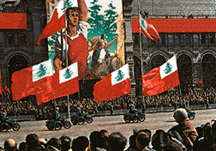 |
TODAY Friday 18 July 1997 Each weekday. Conn Nugent on what's new in the world, on the site. |
newsroom
 |
TODAY Friday 18 July 1997 Each weekday. Conn Nugent on what's new in the world, on the site. |
TODAY IN THE WORLD: All Aboard
The numbers of Americans who love trains has stabilized over the last decade after a free-fall of half a century. There is a new generation of rail buffs, and membership in the American Association of Rail Passengers and the High Speed Rail Association have actually grown a little. Not all people who travel on trains love them, of course, but rail ridership is also up nationwide, albeit slightly. Amtrak gained passengers overall, but the gains were concentrated in routes already decently popular; passengers (and service) tended to decline outside major population clusters.
I myself am both train rider and train lover, which is a modest feat considering the eight years of erratic and often inconsiderate service provided by Amtrak on the route between New York and Springfield, Massachusetts. The distance is 140 miles and the train never makes it in less than three hours and 25 minutes. Delays are more common than punctuality, and no one dreams of complaining if the trip takes thirty minutes longer than scheduled. Some of the conductors are friendly and helpful; some are rude. The views are pleasant, the seats are comfortable, the air conditioning often works, and there are four electrical sockets for laptop people. The chance to work, to read, or to daydream as you move to a destination is what makes rail travel so attractive.
Train travel is also better for the environment than automobile travel, though fistfights break out when statisticians try to quantify the advantage. As the most general of rules, you can estimate that a railroad passenger car has to be more than one-quarter full for someone to say that train travel is a greener way to go. But that's a pretty do-able objective, and the promotion of rail travel (freight perhaps even more than passenger) should be high on any enviro wish-list.
When Congress turns its desultory attention to passenger rail, environmental considerations are usually mentioned only in passing. The arguments are about federal subsidies. A few months ago I stumbled onto C-Span coverage of Senate subcommittee hearings on Amtrak appropriations. Senator John McCain was polite but almost pained in talking about such an obvious example of anti-market porkbarrel. Subsidies for Amtrak were part of the bad old days of quasi-socialism, he said, of well-meaning but inherently inefficient government interventions. Maybe Amtrak could corral enough New Deal Democrats and Northeastern Republicans to survive another year, but only at reduced levels, and only with the understanding that the funding was probably best considered as a stay of execution. The Wall Street Journal and Fortune magazine took the occasion to huff about waste and social engineering, and the Cato Institute provided a study that depicted Amtrak funding as a frustration of the individual citizen's right to choose his or her own form of mobility. Senator McCain was proved right, at least in the short-term -- reduced spending, but no plug-pulling just yet.
That Amtrak is subsidized is beyond argument. But so is every other form of transit, the private automobile most of all. Think of all the services required by the car that are provided through government: roads and bridges; traffic signs and signals; highway police; emergency rooms; drinking water purification; pulmonary medical services; and the world's most expensive military forces, designed and maintained for the express purpose of assuring uninterrupted supplies of petroleum. Way less than half these expenses are covered by gasoline taxes. Air travel is even more lavishly subsidized, particularly through federal assistance in the construction and maintenance of airports.
What Amtrak should receive, recommends The Economist, is not a subsidy to operate a monopoly service on privately-owned infrastructure, but just the opposite. The infrastructure of rails and signals and stations should be provided at government expense, just as government provides highways for trucks and automobiles. Then let competition loose on the provision of services. Might be worth a try, though I'll vote for re-nationalization if the market decides it can't turn a dollar carrying people north of Hartford.
TODAY ON THE SITE
There's some good news for American high-speed-rail buffs these days. It looks as if Amtrak is actually going to make good on its ancient promise of high-speed service between Boston and Washington, no later than 1999. And in other parts of the country, some private and public/private schemes are in the offing. Find out more by looking into our High Five on "Trains (High-Speed)" by the authoritative Howard Learner of Chicago, still the greatest of all American train towns.
Recent "Today" columns:
7/17: Downward and Outward Mobility
7/16: A Muggy Day on The Hill
7/15: Plug for Planet Ark
7/14: Follow Me
7/11: Blood Sports
7/10: Oil and Taxes
7/09: Mexico
7/08: By the Sea, By the Sea
7/07: Huddled Masses
7/03: Three-Dot Environmentalism...
To access more "Today" columns, click "Archives" below.
search | Archives | free newsletter | home
Let us know what you think: listen@libtree.org